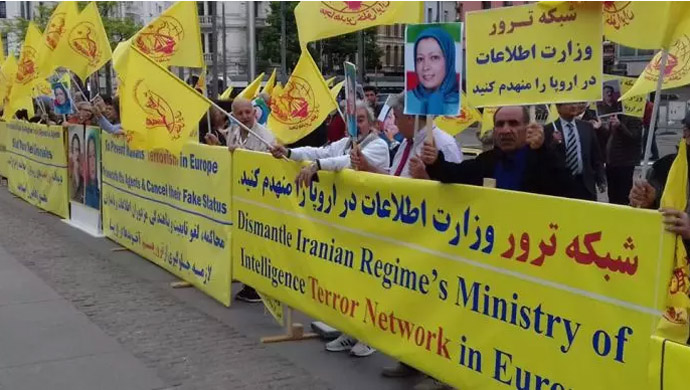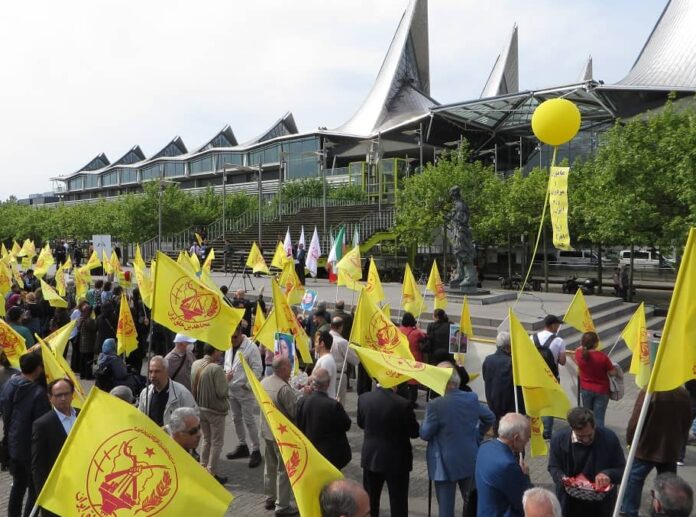The Antwerp appeals court in Belgium issued its final verdict on May 10 for three accomplices of Iranian regime diplomat-terrorist Assadollah Assadi for their role in a foiled bomb plot targeting a massive Iranian Resistance gathering in June 2018 in Villepinte, north of Paris.
Nasimeh Naami, 37, Amir Saadouni, 41, and Mehrdad Arefani, 58, were all sentenced to 18, 18, and 17 years in prison, respectively, their Belgian citizenship and passports were revoked indefinitely, and each was fined 60,000 euros in cash.
In its ruling, the court increased the prison sentence for Saadouni from 15 to 18 years and rejected the claims of the terrorists that they were unaware that what they had planned to blow up was a bomb. “The court rejects the claim by defendants Amir SAADOUNI and Nasimeh NAAMI that they believed that the explosive device would only cause noise and fireworks and that it was never the intention to kill people in the light of the criminal information at hand,” it said.
The court added, “There cannot be the slightest doubt that it was the defendants’ intention from the outset to operate the professionally assembled explosive device (IED), using a remote control, at the large annual MEK congress in Villepinte, where thousands of participants would be present, with intent to kill. Defendants acted premeditated and in a coordinated manner.”
“The Court of Appeal is of the opinion that the present elements of the criminal file leave no room for doubt that Assaddollah ASSADI and the aforementioned defendants had already been actively involved in MOIS and, more specifically, with Department 312 for a long time. It is thereby established that Assaddollah ASSADI came into the picture in 2015 as the intelligence officer associated with MOIS and Department 312 and since March 2018 was also the operational commander of the planned attack on the annual MEK conference in Villepinte,” the statement by the court emphasized.
Earlier, in February 2021, Assadi had been sentenced to 20 years behind bars. Certain of the outcome, Assadi refused to file for an appeal, obviously to prevent further embarrassment and disgrace for the mullahs’ regime in Tehran. This is the first time since World War II that a diplomat has been sentenced to prison in Europe for involvement in terrorism. Assadi is also the first Iranian diplomat ever brought to trial in Europe for direct involvement in terrorism.
During the Antwerp court procedures, the world witnessed the mullahs’ regime in its entirety on trial and the final ruling delivered a decisive defeat for Tehran as the world’s leading state sponsor of terrorism. The victor, in this case, was none other than the Iranian people, the Iranian Resistance, and specifically the People’s Mojahedin Organization of Iran (PMOI/MEK) as the principal opposition against the regime.

All the while, the mullahs’ regime sought to take advantage of diplomatic immunity to prevent any type of accountability and even accuse the PMOI/MEK of planning the entire bomb plot as a false flag operation.
Saeed Khatibzadeh, the regime’s Foreign Ministry spokesman, said the trial in Belgium of Assadi was a pre-planned scenario made up by the PMOI/MEK aimed at spreading Iranophobia. From his arrest to the trial, and even after he was given the 20-year jail term, Assadi’s fundamental rights have been seriously violated in all stages, Khatibzadeh claimed. Tehran is demanding Assad’s immediate release, compensation, and a guarantee that it won’t happen again, Khatibzadeh concluded.
The Antwerp court ruling once again proves the fact that justice and the rule of law continue to justify the PMOI/MEK’s struggle against the mullahs’ regime, while the regime suffers ongoing defeats in such circumstances.
In an online conference that was held on the same day, Robert Joseph, former Under Secretary of State for Arms Control and International Security, said the mullahs’ regime accepted the risks of targeting such a large gathering in 2018 because it is extremely terrified of the PMOI/MEK as its sole alternative. The PMOI/MEK pursue a widespread resistance movement inside Iran that threatens the mullahs’ regime, Amb. Joseph added.
Amb. Robert Joseph
The NCRI and MEK provide the viable alternative to the religious dictatorship of the mullahs. The aspirations of the #Iran|ian people for freedom cannot be denied. #ShutdownIranTerrorEmbassies #BlacklistMOIS https://t.co/PiBvIDC0Wl— People's Mojahedin Organization of Iran (PMOI/MEK) (@Mojahedineng) May 10, 2022
This ruling made it crystal clear that all the regime’s so-called political and diplomatic centers in various countries are, in fact, used to hatch and facilitate Tehran’s espionage and assassination plots. As emphasized by many speakers in Tuesday’s conference, Western governments must bring an end to their appeasement policy vis-à-vis the mullahs, shut down the regime’s embassies and consulates, and expel members of Tehran’s diplomat terrorists, spies, and members of its terror networks.
Mrs. Maryam Rajavi, the president-elect of the National Council of Resistance of Iran (NCRI), who was the prime target of the failed bombing plot, stressed that after the court’s ruling, it is time for the West to adopt a decisive policy toward the mullahs’ regime.
“The time has come for various countries, particularly in Europe and the U.S., to end their silence and inaction over dozens of terrorist operations carried out by the clerical regime,” Mrs. Rajavi said. “They must launch legal investigations into every single one of them. European intelligence services must uncover other dormant cells of the mullahs’ MOIS and the terrorist Quds Force. They must close down the regime’s embassies, which are its centers of espionage and terrorism. They should designate the Islamic Revolutionary Guard Corps (IRGC) and the mullahs’ Ministry of Intelligence (MOIS) in their entirety as terrorist entities. And they should prosecute their agents, revoke their citizenship, and deport them.”
Following the ultimate ruling of the Belgian Court on the terrorist diplomat and his accomplices, EU countries must seize diplomatic relations with the religious fascist regime ruling #Iran to repel its unprecedented growing terrorist activities. #ShutdownIranTerrorEmbassies
— Maryam Rajavi (@Maryam_Rajavi) May 11, 2022
Amb. Lincoln Bloomfield Jr., former Assistant secretary of state for political-military affairs, stressed that the facts laid out in the Antwerp court warrant a new conversation in Washington about the Iranian regime’s institutionalized terrorism.
“Why don’t we ever hear about the MOIS in Washington? When we see people from Iran sitting in think tanks and universities and go to Iran and talk to its leaders, do we investigate them? This is a new conversation that we need to have,” he said. “Iran abused its diplomatic privilege. It had terrorists pose as diplomats. Why don’t we talk about the foreign ministry? This is a regime that has several branches conducting acts of violence and terror. We need a new conversation in Washington. We must understand that for 43 years, this regime has only conducted terrorism, violated the rule of law, and violated international norms.”
.@LBJunior
The NCRI is the opposition to this regime. They are a political organization and #Iran is trying to kill them and us. We need to have a new conversation.#ShutdownIranTerrorEmbassies#BlacklistMOIShttps://t.co/DC5prAtLtK— People's Mojahedin Organization of Iran (PMOI/MEK) (@Mojahedineng) May 10, 2022
Similar to a Swedish court that held hearings for nine months regarding former Iranian official Hamid Noury’s role in the 1988 massacre of over 30,000 political prisoners in Iran, the Antwerp court proves the involvement of senior regime officials in the decision-making process of mass killings in both inside Iran and terror plots abroad. Regime Supreme Leader Ali Khamenei, President Ebrahim Raisi, former president Hassan Rouhani, former foreign minister Mohammad Javad Zarif, and… all have direct roles in these horrific crimes, including crimes against humanity, and must face justice.
It is worth noting that a Swiss court is also investigating the assassination of Dr. Kazem Rajavi, carried out by Iranian regime operatives in 1990, not as a murder case but as “genocide” and a “crime against humanity.” Dr. Rajavi, the older brother of the Iranian Resistance Leader Massoud Rajavi, was a renowned jurist and Iran’s first ambassador to the United Nations in Geneva after the 1979 revolution. He was the representative of the National Council of Resistance of Iran (NCRI) in Switzerland a respected human rights defender. Dr. Rajavi was assassinated by the Iranian regime’s terrorists on April 24, 1990, near his home in Geneva.
The Swiss court refers to the plaintiff’s reasoning that Professor Rajavi was assassinated following the 1988 massacre, which should be, according to his reasoning, legally qualified as genocide and a crime against humanity.
As all these developments show, wherever there is a rule of law, the Iranian people and their resistance movement are victorious over the mullahs’ tyrannical rule.





